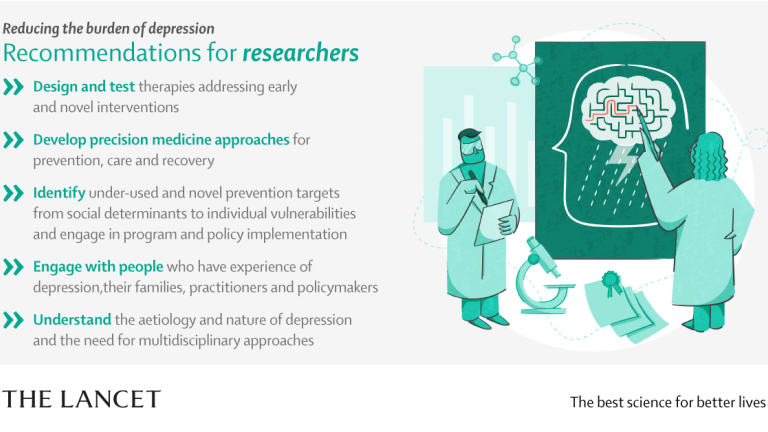The committee consists of 25 experts from 11 countries across disciplines ranging from neuroscience to public health and advised by people with experience of depression. The Netherlands is represented by Professor Pim Cuijpers of Vrije Universiteit Amsterdam (VU) and Professor Brenda Penninx of Amsterdam UMC. The Lancet and the committee note the following:
- An estimated 5% of adults worldwide suffer from depression each year, yet it remains a neglected global health crisis, that has its most frequent onset in young people.
- Poor understanding of this condition and lack of psychosocial and financial resources impact on prevention, diagnosis, treatment, and the economic prosperity of nations.
- The Lancet-World Psychiatric Association Commission outlines ambitious recommendations to tackle inequities and widespread neglect in diagnosis, treatment, and prevention, including prioritizing an innovative staged approach to care and early intervention, and delivering collaborative care in resource-limited and other settings
- The experts call for a whole-of-society approach to preventing depression to achieve benefits similar to those in other fields such as heart disease and cancer, ensuring a holistic pursuit of the UN Sustainable Development Goals.
Despite abundant evidence that much can be done to prevent depression and promote recovery, even in resource-limited settings, an estimated 5% of the world's adult population lives with depression each year. In high-income countries, about half of those suffering from depression are not diagnosed or treated, and this rises to 80-90% in low- and middle-income countries. The COVID-19 pandemic has created additional challenges, with social isolation, grief, uncertainty, deprivation and limited access to health care taking a serious toll on the mental health of millions.
Global action
Against this backdrop, the Commission calls for concerted and collaborative efforts by governments, healthcare providers, researchers, people with depression and their families to improve care and prevention, fill knowledge gaps and raise awareness to address one of the leading causes of preventable suffering and premature death worldwide.
Depression: A poorly recognized and understood condition
Depression is a common condition worldwide, yet many myths continue to surround it and perpetuate passivity. These include common misconceptions that depression is simply sadness, a sign of weakness or limited to certain cultural groups. The commissioners emphasize that depression is a distinct health condition characterized by its persistence, significant impact on daily functioning and long-term health consequences. It can affect anyone regardless of gender, background, social class or age; there is variability in types and prevalence of depressive symptoms and signs across cultures and populations. The risk of depression increases in environments of adversity, including poverty, violence, displacement and gender, racial and other forms of discrimination.
Prevention is key to reducing the burden of depression
The Commission stresses the need for society-wide strategies that reduce exposure to adverse experiences both in childhood (including neglect and trauma) and across the life course to reduce the prevalence of depression. Interventions are also needed at the individual level, targeting lifestyle factors (e.g. smoking, alcohol consumption, physical inactivity) and other risk factors such as intimate partner violence and stressful life events such as bereavement or financial crisis.
A personalised, phased approach to care
The expert committee stresses that the current system of classifying people with symptoms of depression into just two categories - whether they have clinical depression or not - is too simplistic. They indicate that depression is a complex disorder with a variety of signs and symptoms, severity levels and duration across cultures.

Source: VU Amsterdam

